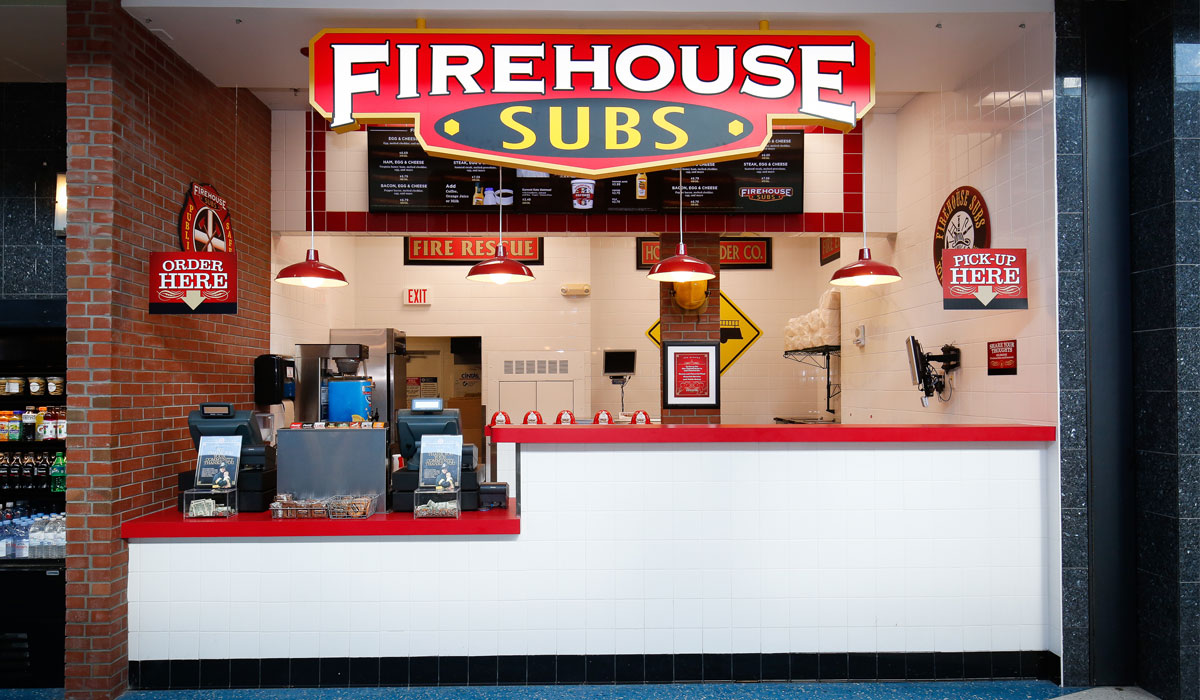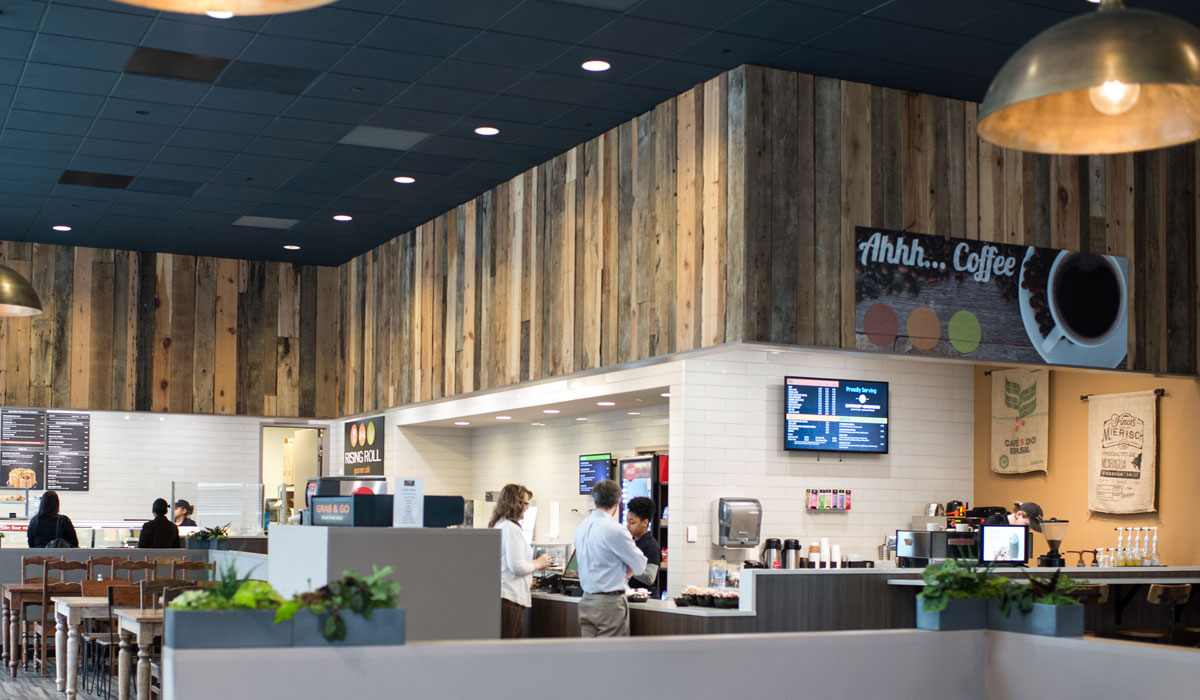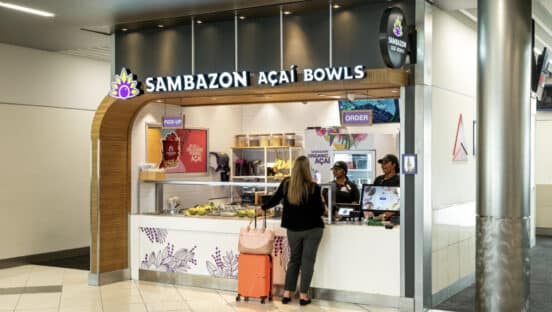Quick service has a legacy of pushing the envelope—especially in terms of location. The earliest fast-food restaurants distinguished themselves by opening shop right off the highways and interstates traversed by millions of Americans.
Much has changed since the early heyday of capturing road trippers, but the directive of getting in front of busy consumers in unconventional locations has only grown. Now chains pop up everywhere from airports and universities to sports arenas and casinos. The advantages of such stores can be especially tempting for emerging brands seeking greater exposure and sometimes a discount to the standard in-line, end-cap, and standalone spaces.
Still, many nontraditional spaces come with their own set of unique challenges, whether it be the red tape associated with operating in an airport or the seasonal nature of a summer-only beach venue.
“In nontraditional, it’s a little bit different. You have time constraints; people aren’t willing to wait five or six minutes for something that has been cooked fresh,” says Casey Patten, cofounder and co-owner of Taylor Gourmet. The Washington, D.C.–based fast casual has grown to 19 locations, including one in Reagan National Airport and another in Nationals Park; it also has a deal in the works with the Capital One Arena, which hosts the Washington Capitals hockey team, concerts, and other live events.
EDITOR’S NOTE: Taylor Gourmet filed for Chapter 7 bankruptcy in September, after this story was completed. Read more about it here.
Patten says that going into these spaces has been a learning experience for the brand. “They need to move much faster to either get to their plane … or there’s a quick time-out and someone wanted to come up and grab a cheesesteak and not miss much of the game. It’s a balance of being able to deliver the same customer experience through a pared-down menu that allows you to operate efficiently,” he adds.
Upending the unorthodox
Indeed, experience is one of the reasons sports arenas, like Nationals Park, have been proffering deals with more micro-chains and local businesses. Increasingly, younger consumers are willing to spend more on higher quality, and when determining where to spend their money, experience often takes the crown. So pairing an event like a baseball game or concert with superior meal options might be the perfect marriage for consumers and operators alike.
Bubbakoo’s Burritos has hit that sweet spot with a location inside The Stone Pony, an iconic music venue in Asbury Park, New Jersey, where artists like Bruce Springsteen and Jon Bon Jovi performed early in their careers. As the main foodservice operation within The Stone Pony, the 20-unit chain does very well in the space.
“It’s been a very lucrative situation for us,” says Bubbakoo’s cofounder and co-owner Paul Altero. “It’s a captive crowd. We’re only open when they’re there, which is awesome. It’s not like traditional locations where you open up at 10 or 11 in the morning and you’re closing at 9, and you’re more or less waiting for the business.”
Altero says his business partner Bill Hart is an avid music fan and made contacts at The Stone Pony while attending concerts. At the time, the venue was doing its own foodservice on site and, by Altero’s estimation, struggling to manage the operation, often ordering pizzas to appease hungry crowds. So, Altero and Hart pitched Bubbakoo’s, won the contract, and have been serving concertgoers since summer 2017, with The Stone Pony continuing to manage the libations.
Inside, Bubbakoo’s has a year-round operation; it’s a small space but with enough room for a make line. Still, the brand’s build-your-own proposition and throughput can be difficult. That challenge is further compounded during warmer months, when The Stone Pony hosts Summer Stage with outside shows. Bubbakoo’s sets up along with other food operators, but it’s virtually impossible to turn out individualized orders.
“Because it is so busy and it’s such a high-capacity venue, I would say customization, which is what we’re all about, gets compromised. They’re premade burritos already, and the other options get limited, but that’s the only way to service that type of crowd,” Altero says. “You have thousands of people butted up against each other; you really don’t have the time to prepare each burrito individually.”
He adds that even those basic, premade burritos are “jacked up” with ingredients like crispy buffalo chicken, pico de gallo, cheese, and sour cream. If customers have their hearts set on a customized order, they can go inside and order one at the permanent spot.
The Stone Pony is one of three nontraditional stores in Bubbakoo’s system. That trio differs not only from one another but also from the greater nontraditional space, which is, by definition, already unique compared to the typical restaurant. The other two are housed in the Atlantic City Resorts Casino & Hotel and the Dunes Boardwalk Café, a beachfront food hall in Ocean Grove, New Jersey. Unlike The Stone Pony, foot traffic at these locations ebbs and flows as it would at a regular retail store—with the exception of when the casino hosts special events. The shift is particularly marked at the Dunes Boardwalk Café, which is largely a summer business.

No matter the growth stage
That seasonal cycle is a given in another, more common nontraditional space: university campuses.
“I like higher education. I think there’s a great opportunity there. … We have some of our classic menu items but then bring in items for millennials and a younger population to really expand the demographic profile of our customers,” says Michael Lassiter, CEO of café concept Rising Roll. “By doing that, we got on our initial university campus. People saw our brand, and we had other opportunities come up with university campuses, and that really just took off.”
Rising Roll hitched its early growth to nontraditional, which accounts for about three-quarters of the brand’s 19 units. In its Atlanta home base, most of the locations are in class A office buildings, while its expansion to other states is almost exclusively through major state colleges, including the University of Florida and the University of Virginia. The micro-chain also has a few stores in hospitals.
While Lassiter recognizes the appeal of nontraditional markets, the decision to focus on such locations came down to necessity more than anything else.
“As people—in our opinion—were overpaying for some sites, we were looking at opportunities that gave our franchisees a chance to be successful. One of the things that we noticed is you can have great locations and even have somewhat of a retail presence in nontraditional locations, and the rents were a heck of a lot better,” Lassiter says. “It was a no-brainer for us.”
That’s not to say that build-outs in airports, colleges, and similar spaces are easy to acquire. For many brands, getting a foot in the door can be challenging, but once they partner with a licensee and secure one location, others follow almost organically. That was the case for Rising Roll on college campuses, and it’s also the hope for Firehouse Subs, which has begun making a push into universities, as well as airports. But whereas Rising Roll started with nontraditional for budgetary reasons, Firehouse Subs is pursuing that route because it’s white space. It is, after all, an established brand with more than 1,100 units.
“Street-side opportunities are starting to get limited in many parts of the United States,” says Greg Delks, vice president of franchise, global, and nontraditional development at Firehouse Subs. Delks, who has been with the company a dozen years, began studying up on these alternative locations a few years ago. Now the brand is set to ramp up expansion in that area. “We’re masters of street-side development, so nontraditional has been quite the learning curve, and I’ve made myself a student of nontraditional … over the last two to four years. It’s taken me this long to really start to get traction,” he adds.
But even Delks, a veteran of franchise development, found the process—for both universities and airports—to be more involved than he’d anticipated, saying he was “educated in the higher education way of doing business.”
Unlike Rising Roll, Firehouse Subs is starting small before ramping up to bigger schools. “Sure, we’d love the Michigan, Michigan States of the world, but I would rather start small, learn it, troll it, grow with it, and then be able to have scalability and take it and do the same thing anywhere,” Delks says.
In 2015, Firehouse Subs tested the waters of university dining with a limited-menu location at Kansas City Community College, which is operated by a local franchisee who also has a street-side restaurant. Nevertheless, the company bills the location at Western New England University (wne) as its first on-campus college store since it boasts both the full menu and online ordering. The WNE unit, which opened in April, is also the model for future campus-dining growth. So far, Delks says he’s been pleased with how the brand has been received but knows he won’t really see the fruits of this labor until 2019, when the locations have gone through a full academic year in business.
“Campus dining is a totally different trade area than even across the street. Being part of the meal plan and having access to those students on campus, that’s the motivator,” Delk says. “And most college campuses are really transforming themselves into a complete retail environment.”
He’d like to see Firehouse Subs open more on-campus locations and thinks between 10 and 20 units over the next five years is an attainable goal. For one, timing is key; Delks says aspiring tenants must wait for current leases to end.

‘Two to tango’
Perhaps even more important is deciding whether to work with a partner and then finding the right one. In most scenarios, restaurants can choose to run those stores themselves. They would have more control over the unit, but they would also forfeit the expertise of the licensee. Unlike the open market where aspiring business owners can apply to be franchisees, airports, universities, and similar spaces are almost exclusively ruled by big players with long track records and vast networks (see sidebar).
If a concept chooses the licensee route, it faces another slew of questions.
“You need to take a look at that relationship the same way you would any other big relationship in your business or in your personal life, because it’s an interesting one and it’s a delicate one. It takes work from both sides to make it successful,” Taylor Gourmet’s Patten says. “It takes two to tango, so selecting your partner, I think, is … probably the biggest decision that you’re going to make when moving into the space.”
Once that relationship is established, a brand can decide to go into what Delks calls the licensee’s three-ring binder. When contracts come up, the licensee can present restaurants in its portfolio as potential candidates. For example, Firehouse Subs teamed up with foodservice giant Aramark for its WNE location. Moving forward, Aramark can shop Firehouse Subs around to other universities.
It’s a somewhat similar process in airports, albeit with an added layer of security considerations. “It’s complex, and it’s dominated by big players. We initially thought we could go into airports on our own, without a licensee, and that’s when you start learning about [Airport Disadvantaged Business Enterprise programs] and primes and all of the mechanics behind the logistics of getting product into the airports,” Delks says. “It’s so time consuming. … You need partners.”
On top of that, Delks adds, airports are far more expensive to operate in. But the return on investment can be well worth the hassle and price, both in terms of sales and brand promotion. With HMSHost as the licensee, Firehouse Subs has airport shops in its hometown of Jacksonville, Florida, as well as Orlando International Airport, which welcomed nearly 45 million travelers last year. Delks says the brand plans to open five more by the end of 2019, and also has submitted requests for proposals with a handful of other airports, although not all through HMSHost; licensees for nontraditional spaces do not typically require exclusivity.
Future reconfigurations
Panda Express, another well-established chain, is using airports as its launch pad into foreign markets; just this past summer it opened its first international flagship location in Dubai International Airport. The U.S.’s largest Asian quick serve got its start in malls—another nontraditional space—but as food courts fell out of favor, it was able to transition to street level, much like Chick-fil-A did.
Brian Jarvis is the senior real estate manager at Panda Restaurant Group and spearheads the brand’s nontraditional expansion. He says that because of its mall roots, the company is comfortable operating in smaller spaces, as exemplified by its roughly 20 airport stores and more than 100 university locations.
“We’re really focusing on some of the international airports. With the rise in globalization, there’s a number of hubs around the world that are going through a major renovation process,” Jarvis says. “It’s an opportunity to plant a flagship location for our brand so that people all over the world get to experience what it’s like to eat at a Panda Express.” He adds that because the infrastructure of many airports is older, the next 5–10 years will open the door to more potential domestic locations as those hubs are updated.
At present, roughly 600 of the 2,000 locations are in nontraditional spaces. Although Panda Express will make an aggressive pass at airports, Jarvis expects that number will decrease over time as the brand continues to exit malls.
In the meantime, Jarvis and his team are working to reconcile the rise in mobile orders with the challenges of throughput in nontraditional. Compared with most other locations, airports are full of harried travelers looking for ready-made meals. This is tricky for Panda Express, not only because of the nature of its menu (hot, made-to-order dishes), but also because of space limitations.
“As consumers have less time, they’re looking for more grab-and-go options, and doing that with hot food is something everybody’s trying to figure out, as well as mobile ordering and pickup,” Jarvis says. “In nontraditional … you’re struggling just to fit your full kitchen, dry storage, and prep area into those spaces, so then having to also accommodate either grab-and-go and mobile apps is a huge opportunity, but it’s also a
big challenge.”







